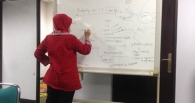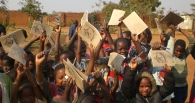Staying the course in South Sudan
Reflections on two years spent as an ODI Fellow
Stephanie Allan
18 July 2013
/
- 0 Comments
The ODI fellowship scheme has been placing junior economists in line positions in Governments of developing countries for 50 years, and counts the founders of Mokoro amongst its alumni. As my two-year posting in the Ministry of Finance and Economic Planning of the Government of South Sudan draws to a close, I consider myself very fortunate to have experienced firsthand the realities a Government faces when grappling with the challenges of state-building, and how donor assistance could be better tailored to support that effort. In environments emerging from protracted conflict, reform progress is too often tempered by political instability and sporadic episodes of insecurity. Having borne witness to South Sudan’s exceptional first two years as an independent nation, I believe it can provide some relevant lessons on the importance of development actors staying the course when conditions deteriorate, as they very likely may.
As an ODI fellow embedded within Government, you are afforded a privileged appreciation of the operational difficulties that institution faces, and I was struck very early on by the widespread and embedded nature of the capacity challenges in South Sudan. The Government has less than two years of experience of independent rule (in addition to six years of a bare-bones autonomous regional Government), certainly not long enough to substantially address the legacy of five decades of conflict, which includes chronic under-delivery of services, scarce investment in infrastructure, and large-scale displacement and loss of life. Building a civil service and the administrative architecture of Government under such human capacity constraints, compounded by the burden of buying peace through sinecures for former guerrillas, is a profound challenge facing the fledgling Government, and as a working environment presents advantages and frustrations for an ODI fellow. Over the course of the last two years, I have often been assigned tasks for which I have very little or no experience to draw on, simply because there is no one else to do it. From developing TOR for a debt committee in the middle of a fiscal crisis, to writing a speech on the relationship between South Sudan and South Korea, no two days have been the same and I can attest to a very steep learning curve in the art of “muddling through”.
Whilst this exposure has been invaluable and equipped me with skills and experience I could not have expected to replicate elsewhere, the flip side to working in an environment of low national capacity is having to take on menial and time-consuming tasks for precisely the same reason – who else would do it? Sunday evening data entry into the Government’s aid management system is a skill I have certainly come to master, although not one I am looking to hone any further. Partly, I think this systemic lack of human capacity in Government is a reflection of donor support not targeting the critical blockages; offers of specialist technical assistance to the Ministry of Finance are abundant, but financing for large-scale training of government officials in basic PFM and IT skills has proven more difficult to secure.
Being embedded full-time in Government for a comparatively long period allows an ODI fellow to build close working relationships with government colleagues. As a result, fellows are perceived to possess a degree of legitimacy in representing Government, both from within the Government itself and by external stakeholders. Being posted in the department of aid coordination, I have found this privilege to be particularly pronounced; it is commonplace for development partners, themselves disorientated by the web of government bureaucracy, to view the fellows as a first port of call or point of entry to the Ministry. For the purposes of trying to support the delivery and coordination of aid, this network has proved invaluable, but it does come with a danger of being seen as a “proxy government”, and on occasion I have had to push back against some donors looking to circumvent deeper government consultation with a light-touch endorsement from the ODI fellow.
Although institutional development is a long, complex and costly process, from what I saw in South Sudan I would still maintain that working in or within Government is the most effective way to nurture and support reform. The work that Catherine Dom and the Budget Strengthening Initiative team have been doing to identify and address the key capacity and financing blockages preventing local governments from delivering services as per their mandates is a positive example of this. This line of work means that the 2013/14 budget will include a package of additional grants totaling SSP 347 million ($115m) for local governments, alongside detailed manuals to spell out how that money should be spent and accounted for.
However, I have also found that the nature of the post-conflict environment means that such Government-led reform progress is very fragile, and shocks manifesting from the political sphere can undermine and undo such progress at an alarming rate and frequency. Over the relatively brief time I have spent in South Sudan, I have seen a number of such shocks, the most severe of which occurred four months after my arrival when the Government announced the shutdown of oil production over disagreements with Khartoum regarding transportation fees, border demarcation and alleged support for rebellious factions. Given that the pipeline through Sudan was the only way the land-locked South could export its oil, the macroeconomic and fiscal consequences of this decision were grave. GDP fell by 53% between 2011 and 2012, and public expenditure, 98% of which had previously been financed by oil, was sharply reined in through a series of austerity reforms that stripped the budget down to basic salary expenditures, with very little in the way of capital or operational funding. Given such conditions, implementation of service delivery reforms was swiftly curtailed, and much needed investment in infrastructure ground to a halt.
Donor agencies proved also to be highly susceptible to such political shock. Some partners, disappointed that they had not been consulted on the decision, cut back their aid budgets, whilst others explicitly reprogrammed funds previously allocated to long-term developmental projects (including much-needed roads) to humanitarian agencies. Most discouragingly, the progress the Government had made in developing a framework for gradual greater donor use of government systems as they were strengthened was set back significantly. Whilst the international community wanted to avoid being seen to be bankrolling the Government’s decision, the hard-won gains in service delivery stood in the balance.
Fortunately, the situation didn’t deteriorate as acutely as some had foreseen. After a period of rapid inflation, prices stabilized and the parallel exchange rate largely recovered. In some respects, the oil shut-down even sparked positive reform progress, particularly in the area of budget transparency. Gradually, over a period of a year, Government and the international community worked hard to rebuild their partnership, enabled in part by the political return to favour of South Sudan in the eyes of the US State Department. As an endorsement of the Government’s reforms to date, and in an effort to protect basic services and consolidate progress in key areas of PFM, governance and natural resource management, South Sudan will for the first time next year be in receipt of sector and general budget support and additional aid channelled through country systems, to the tune of $200m.
Presently the oil is flowing, although revenues remain uncertain and relations with Khartoum strained. The internal political environment is also volatile, so it would not be foolhardy to foresee another crisis in the not so distant future. The question facing South Sudan is how to secure long-term Government commitment to reform, and support from the international community for service delivery and institutional strengthening which stays the course in light of any deterioration in the political environment. To borrow the OECD-DAC framework, it calls for a progressive approach to risk that gives fair attention to programmatic risk, not just contextual and institutional risk. The thinking behind the New Deal for Engagement in Fragile States initiative, which has been developed by the g7+ (of which South Sudan is an active member) is very welcome in this regard, but implementation is sorely lagging behind. It is hoped that the planned signing of a Compact, securing high-level political commitment and international endorsement of the Government’s reform agenda, underpinned by a package of innovative aid instruments that use and strengthen country systems whilst being flexible to adapt to a fluid context, may bear some fruit in this respect.
I am enormously grateful to have spent two years working in the middle of a seminal institution of Government in the first two years of its independence, as it tries with varying degrees of success to build a country and deliver the dividends of peace. Progress has been chaotic, and given what we can reasonably expect from post-conflict environments, perhaps more chaotic than it needed to be. Thankfully, I can say there is a lot of good will for the country, and willingness to see it on the right path.
You must be logged in to post a comment.



